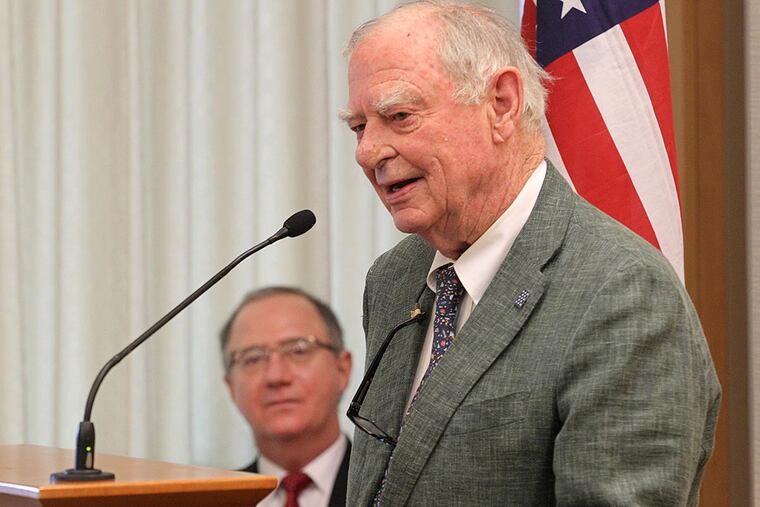For journalism institute, new members - and big challenges
The Philadelphia institute charged with finding ways forward in a fractured media landscape has brought on new board members who are digital-age leaders and inventors.

The Philadelphia institute charged with finding ways forward in a fractured media landscape has brought on new board members who are digital-age leaders and inventors.
The Institute for Journalism in New Media on Thursday announced a five-person expansion, people it says will help spur innovation and develop means to fund and sustain the business of news.
"These five individuals are pioneers in their respective industries," said H.F. "Gerry" Lenfest, who created the institute and chairs its board of managers.
The institute has several training, grant, and technology initiatives in the works, and expects to announce the first of those in the new year.
Lenfest, well-known as a philanthropist, earlier donated Philadelphia Media Network - owner of the Inquirer, the Daily News, and Philly.com - to the new institute, which was then placed under the umbrella of the Philadelphia Foundation. The link of news company, media institute, and charitable foundation broke ground in a perilous economic environment for traditional news organizations.
"When Gerry called, it was a no-brainer for me," said new board member Martin Nisenholtz, founder and CEO of the New York Times Digital and founder of Ogilvy Interactive. "We really do need as much innovative thinking and resources as possible behind how we're going to make this transition."
The nonprofit structure is designed to foster experiments in ways of delivering the news, and open philanthropic avenues to fund journalism.
"I'm excited about the opportunity, and grateful that Philadelphia is the venue for this kind of exploration," said new board member Sara Lomax-Reese, president and CEO of WURD Radio, the state's only African American-owned talk station. "It's such a racially diverse city, a culturally diverse city - everything you need to figure out the complexity of this issue is right here."
New board member Vijay Ravindran, formerly chief digital officer at the Washington Post Co., said he's optimistic about the business of news, particularly given the test lab that is Philadelphia.
"This is an opportunity to work with a team that can really shape the future," said Ravindran, now CEO of Floreo, a firm that creates virtual-reality applications for children with autism. "Getting those kinds of minds together gives us a great chance to attack some of the biggest challenges in the industry."
The new members, which take the board to its full complement of 15, were selected after a formal search.
"There's a palpable excitement about what we're trying to do," said Jim Friedlich, the institute's executive director. "We're addressing an extremely important and challenging issue - how to sustain great journalism through a sea change in technology and business model."
Two digital veterans also joined the institute leadership team. Ken Herts, who led finance for Dow Jones Consumer Media, including the Wall Street Journal, Barron's, and MarketWatch, becomes director of media business design. And Burt Herman, cofounder of Storify, is director of innovation projects.
"This body, with all the different backgrounds and skill sets, is uniquely prepared, and I think can turn the tide," said new board member Hong Qu, the former chief technology officer at Fusion, who has worked on development teams at Google and YouTube. "The focus of it really got me excited. Because it's about the local level, the consumers, the community that's impacted."
The other new board member, Tony Haile, was the founding CEO of Chartbeat, the analytics company, and is now the founding CEO of Scroll, which seeks to improve reader experience while sustaining good journalism.
"Those five give us something a little bit different," adding high-level digital skill and expertise, said Stan Wischnowski, vice president and executive editor of PMN. "We've got more smart people in the tent."
Inquirer editor William K. Marimow called the selections "a major breakthrough for the institute, and for news organizations in the Philadelphia area, especially ours."
The institute is charged with finding ways to ensure that quality journalism endures in the Philadelphia region, even as advertising declines amid a glut of free online news.
Gannett Co., the nation's largest newspaper chain, last month laid off about 350 people. The Wall Street Journal has laid off staff and trimmed its print edition, while about 70 New York Times employees took buyouts this year.
Locally, PMN has offered buyouts to Newspaper Guild members in the newsroom and other departments who are over age 62 and have at least 13 years of service. So far, 15 employees have applied. The deadline is Friday.
On Thursday, PMN publisher Terrance C.Z. Egger said, "We are not contemplating any newsroom layoffs."
215-854-4906@JeffGammage